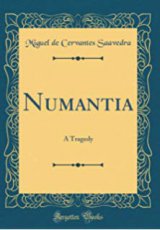The Siege of Numantia Page #18
The Siege of Numantia is a tragedy by Miguel de Cervantes set at the siege of Numantia. The play is divided into four acts. The dialogue is sometimes in tercets and sometimes in redondillas, but for the most part in octaves.
So, fleeing from the swords upraised to slay, Do these poor children, and these tender wives, Run on from street to street, O fate insane! To lengthen out their certain death, in vain. Within the breast of his belovèd bride The husband sheathes his keen and glittering brand; Devoid of pity, and of filial pride, The son against the mother turns his hand; The father, casting clemency aside, Against his very offspring takes his stand, And while with furious thrusts to death they bleed, He finds a piteous pleasure in the deed! No square, or street, or mansion can be found, That is not filled with blood and with the dead; The sword destroys, the fierce fire blazes round, And Cruelty with fearsome step doth tread! Soon will ye see upon the level ground The strongest and the loftiest turrets spread, The humble dwellings, and the temples high, Shall turn to dust and ashes by and by! Come, ye shall see how in the bosoms dear Of tender children and belovèd wife Theogenes, with courage all austere, Doth prove the temper of his cruel knife; And when the deadly work is over here, So little recks he of his wearied life, He seeks for Death, and by a mode unknown, Which causes other ruin than his own! WAR. Now let us go; and see that each prepare To do his proper work within this spot; To what I say give undivided care, Nor swerve from my intention by one jot. [Exeunt. SCENE III. [THEOGENES enters with two young SONS and a daughter and their MOTHER. THEOGENES. If love paternal hath no longer sway To check the fearful deed which I intend; Think, O my sons, if I can now give way, When thoughts of honour with my purpose blend! O poignant is the grief, the sore dismay, We feel when Life must have a sudden end; But mine is more, since I by Fate's decree Your cruel executioner must be! Ye shall not live, O children of my soul, To be the Romans' slaves, nor shall their power, However much it rage beyond control, Above our lives and yours in triumph tower. The shortest road which leadeth to the goal Of our dear Liberty in this sad hour, Which Heaven offers us with piteous breath, Conducts us only to the arms of Death. Nor thou, dear consort, sweetest of thy race, Shalt suffer peril from the Roman bands; Nor shall they soil thy modesty and grace With eyes lascivious, or with ruthless hands! My sword shall snatch thee from this foul disgrace, Their schemes shall baffled be by my commands, And this shall be the guerdon of their lust, To triumph o'er Numantia in the dust! Thou, dear, belovèd consort, it was I Who first advised that we, with one accord, Should rather perish than as cravens lie Beneath the terror of the Roman sword; I will not therefore be the last to die, Nor shall my children here. Wife. If, good my lord, There were some other way to set us free, Then Heaven knows how happy I should be! But since it cannot be, to my regret, And since my road to death is near and plain, Keep back the brutal Roman sword, and let The trophy of our lives with thee remain. Though death be sure, it is my pleasure yet To die within Diana's sacred fane; Good husband, lead us, and in loving ire Consign us to the sword, the rope, the fire! THEOGENES. So may it be, nor let our steps be slow, For cruel Fate doth urge me on to death. Son. Why weepest, mother? Whither do we go? Stay, stay, I am so faint, I have no breath! My mother, let us eat, 'tis better so, For me this bitter hunger wearyeth. Mother. Come to my arms, my darling sweet and good, And I to thee will give thy death for food! [Exeunt, and two lads enter flying, one of whom is he who will hurl himself from the tower, called VIRIATO, the other SERVIO. VIRIATO. Servio, whither shall we fly? SERVIO. I will go the way thou shewest. VIRIATO. Come, how lazily thou goest! Dost thou wish that both should die? Sad one, look behind, before, Thousand swords pursue to slay! SERVIO. Never can we get away, 'Tis for us a task too sore. Tell me, what dost thou desire? Tell me, and I shall decide. VIRIATO. I shall run, and straightway hide In the turret of my sire. SERVIO. Friend, 'tis well for thee to go, But I cannot, worn and weary, And the road so long and dreary, Hunger gnaws and pains me so. VIRIATO. Wilt thou not? SERVIO. O leave me here. VIRIATO. If thou canst no longer fly, Here, alas, thou hast to die, Slain by hunger, sword, or fear! Go I must, for much I dread All that robs me of my life; Be it fire or cruel knife Which would lay me with the dead! [Exit, and THEOGENES enters with two drawn swords, his hands bloody, and as SERVIO sees him come he flees and goes behind. THEOGENES. O blood, that from my very bosom flows, Since thou belongest to my children dear; O hand, which wounds thyself with deadly blows, Replete with honour and with might austere; Thou Fortune, who art privy to our woes; Ye Heavens, devoid of pity or of cheer, Afford me now, in this my bitter lot, Some glorious, speedy death upon the spot! O valiant Numantines, take ye account That some perfidious Roman foe am I, Avenge within my bosom your affront, And in its blood your hands and weapons dye! [He hurls one sword from his hand. Of these two swords take one, and quick confront My fury wild, my grief that rageth high; For, dying in the fight, we will not know The keenest rigour of the final blow! And he who cuts the other's vital thread, Let him, in token of the favour free, Entomb within the flame the wretched dead, A duty this of highest charity! Come quick, come now! O whither have ye sped? My life the highest sacrifice will be; That sweet compassion, which to friends ye show, Change now to rabid rage against the foe! A Numantine. Whom, brave Theogenes, dost thou invoke? What novel mode of dying dost thou seek? Why dost thou urge us onward, and provoke To such a strange and lamentable freak? THEOGENES. O valiant Numantine, if terror's yoke Hath not unnerved thine arm and made it weak, Take now this sword, and prove its point on me, As if I were thy mortal enemy!
Translation
Translate and read this book in other languages:
Select another language:
- - Select -
- 简体中文 (Chinese - Simplified)
- 繁體中文 (Chinese - Traditional)
- Español (Spanish)
- Esperanto (Esperanto)
- 日本語 (Japanese)
- Português (Portuguese)
- Deutsch (German)
- العربية (Arabic)
- Français (French)
- Русский (Russian)
- ಕನ್ನಡ (Kannada)
- 한국어 (Korean)
- עברית (Hebrew)
- Gaeilge (Irish)
- Українська (Ukrainian)
- اردو (Urdu)
- Magyar (Hungarian)
- मानक हिन्दी (Hindi)
- Indonesia (Indonesian)
- Italiano (Italian)
- தமிழ் (Tamil)
- Türkçe (Turkish)
- తెలుగు (Telugu)
- ภาษาไทย (Thai)
- Tiếng Việt (Vietnamese)
- Čeština (Czech)
- Polski (Polish)
- Bahasa Indonesia (Indonesian)
- Românește (Romanian)
- Nederlands (Dutch)
- Ελληνικά (Greek)
- Latinum (Latin)
- Svenska (Swedish)
- Dansk (Danish)
- Suomi (Finnish)
- فارسی (Persian)
- ייִדיש (Yiddish)
- հայերեն (Armenian)
- Norsk (Norwegian)
- English (English)
Citation
Use the citation below to add this book to your bibliography:
Style:MLAChicagoAPA
"The Siege of Numantia Books." Literature.com. STANDS4 LLC, 2024. Web. 25 Nov. 2024. <https://www.literature.com/book/the_siege_of_numantia_60>.




Discuss this The Siege of Numantia book with the community:
Report Comment
We're doing our best to make sure our content is useful, accurate and safe.
If by any chance you spot an inappropriate comment while navigating through our website please use this form to let us know, and we'll take care of it shortly.
Attachment
You need to be logged in to favorite.
Log In